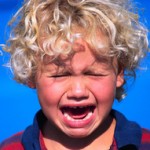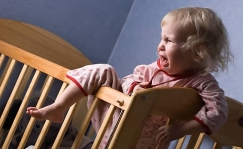Published: August 17, 2010
From the Big Thinks Dangerous Ideas,Max Miller contests Parents don’t matter
 Parents don’t have as much impact on their kids as they think. Yet the amount of time parents, especially moms, spend with their kids has risen dramatically. This would make sense if kids were providing their parents with commensurate increases in joy, but the sad fact is that kids don’t make us happier. In fact, a study by sociologist Robin Simon from Wake Forest says that parents are, across the board, more depressed than non-parents.
Parents don’t have as much impact on their kids as they think. Yet the amount of time parents, especially moms, spend with their kids has risen dramatically. This would make sense if kids were providing their parents with commensurate increases in joy, but the sad fact is that kids don’t make us happier. In fact, a study by sociologist Robin Simon from Wake Forest says that parents are, across the board, more depressed than non-parents.
Parents need to take a step back and reconsider their priorities. So-called helicopter moms are sacrificing friendships, communities, and even marriages to hyper-manage their children’s lives, says sociologist Margaret Nelson from Middlebury College. And while some studies say helicopter parenting can lead to neurotic kids, Nelson is worried less about the kids and more about the mothers’ sanity link to article
Source: Big Think
Tolstoy wrote that every unhappy family is unhappy in its own way, and a new study in the August 2010 issue of the Journal of Marriage and Family finds significant national differences in the degree of conflict between older parents and their adult children.

istockphoto
“Given that family life has its basis in the tension between the desire for autonomy and the need for interdependence, it is not surprising that intergenerational relations—throughout the family life cycle—are among the most ambivalent of social relationships,” said Merril Silverstein, USC professor of gerontology and sociology, and lead author of the study.
[continue reading…]
 Oh dear ..Mothers already wilting under a barrage of contradictory advice about child-rearing are told that nurseries will damage their children, the naughty step is counter-productive and that toddler misbehaviour is all their fault.
Oh dear ..Mothers already wilting under a barrage of contradictory advice about child-rearing are told that nurseries will damage their children, the naughty step is counter-productive and that toddler misbehaviour is all their fault.
The psychologist and broadcaster Oliver James has stomped on to sensitive terrain with a book that suggests mothers of toddlers should avoid working outside the home. In a work that has already provoked howls of anger, he argues that children should not be left in the care of others for long periods, and lays into the strict disciplining of young children by comparing it to training them “like a dog in a laboratory”. Link to continue reading
Source: The Times
Published: April 19, 2010

Nearly 9 in 10 parents choose to discuss and reason with their misbehaving children, while 1 in 5 use spanking, and 1 in 10 use paddling for discipline, the C.S. Mott Children’s Hospital National Poll on Children’s Health finds.
isbehaving is part of growing up and learning right from wrong. Parents’ choices of discipline for their kids today include a wide range of options, from verbal discussions to physical punishment. But these days, how do parents let kids know they have stepped out of line?
In the latest C.S. www.med.umich.edu/mott/npch”>Mott Children’s Hospital National Poll on Children’s Health, the three most common discipline strategies parents report they are very likely to use include:
– Explain or reason with the child – 88 percent
– Take away a privilege or something the child enjoys – 70 percent
– Put child in a time a out or grounding – 59 percent
[continue reading…]
 Parents don’t have as much impact on their kids as they think. Yet the amount of time parents, especially moms, spend with their kids has risen dramatically. This would make sense if kids were providing their parents with commensurate increases in joy, but the sad fact is that kids don’t make us happier. In fact, a study by sociologist Robin Simon from Wake Forest says that parents are, across the board, more depressed than non-parents.
Parents don’t have as much impact on their kids as they think. Yet the amount of time parents, especially moms, spend with their kids has risen dramatically. This would make sense if kids were providing their parents with commensurate increases in joy, but the sad fact is that kids don’t make us happier. In fact, a study by sociologist Robin Simon from Wake Forest says that parents are, across the board, more depressed than non-parents.


